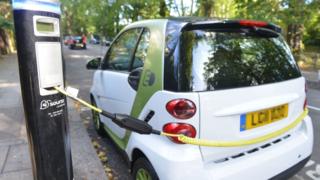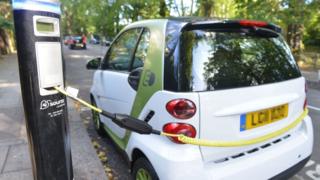Electric cars ‘will not solve transport problem,’ report warns


Car use will still need to be curbed even when all vehicles are powered by clean electricity, a report has said.
It warns that electrifying cars will not address traffic jams, urban sprawl and wasted space for parking.
The Centre for Research into Energy Demand Solutions (CREDS) report calls on the government to devise a strategy allowing people to have a good standard of living without needing a car.
The government said it was spending £2bn to promote walking and cycling.
It also says it plans to spend £50bn on improving roads. However, critics accuse the government of not having a serious plan to deal with the social problems associated with mass car ownership.
CREDS is an academic consortium of more than 80 academics across the UK.
“Car use is a massive blind spot on government policy,” Prof Jillian Anable, one of the authors of the report, said.
She added: “For many years ministers have adopted the principle of trying to meet demand by increasing road space.
“They need to reduce demand instead.”
But what about people who depend on their cars?
The authors say there will always be people who depend on cars, especially in the countryside or suburbs.
But, they point out that many young people in cities are choosing not to buy cars.
Instead they are using public transport, walking, cycling, taking minicabs and hiring cars when they are needed.

Media playback is unsupported on your device
This more active lifestyle means less obesity, pollution and road danger – and greater sociability as people meet their neighbours on their way to work.
It also allows parking spaces to be liberated for more housing or gardens.
The government, the authors say, should be encouraging other people to follow the lead set by the young.
“It is a happy accident that car ownership is static in every age group except the over-60s,” Prof Anable says. “The government should build on that.”
How could we help people to live without cars?
She maintains car ownership is wasteful because cars are parked for 98% of their lifetime, with a third of cars not going out every day.
“Once you own a car,” she says, “there is a compelling temptation to use it even for simple journeys.
“But it is a really expensive investment. If people do not have cars they can spend the money on other things.
“Often once people start to live without a car they wonder why they wanted one in the first place – a car is so much hassle.”
She says ministers should prioritise walking, cycling, public transport and vehicle-sharing wherever possible.
They should also incentivise local councils to build housing developments that are easy to access without a car.
That would also benefit the 25% of households that do not have cars.
Won’t electric cars be a good thing?
The report supports government efforts to phase out petrol and diesel cars in the move towards Net Zero emissions.
But it says the timetable is too slow, and may not be achieved anyway.
There is a huge challenge in charging vehicles – especially in urban areas with no off-street parking.
What is more, drivers tend to be choosing hybrid vehicles rather than pure electric cars – and that will lock in fossil fuel usage into the future.
People are also buying status-symbol SUVs which clog up narrow city streets – the report says banning them in from some areas might be a solution.
Will driverless cars help?
The other great technological change under way on the roads is driverless cars.
The report warns this dream could also turn sour as car owners may choose to live many miles from their workplace, using their car as a mobile office while sitting in traffic jams they have helped to create.
The AA’s president Edmund King agrees electric driverless cars could make congestion worse.
He told us: “One vision of hell is that the driverless car turns up in the city centre where there is no parking.
“The occupant gets out to do their business, whilst the car just continues driving around for hours on end until beckoned back by the user.”
He suggests perhaps switching vehicle taxation away from petrol and diesel and on to Road Miles – a charge for the miles you drive, imposed electronically.
How are people reacting to the report?
A spokesperson for the Department for Transport said: “We are committed to future-proofing our towns and cities for journeys which reduce traffic, encourage healthy exercise, tackle carbon emissions and improve air quality.
“This year, we launched the biggest regulatory review in a generation to ensure we are ready to take advantage of new technologies which can help achieve this.
“We are also helping more people choose cleaner, greener forms of transport by investing around £2bn in active travel over the course of this Parliament.”
But, Labour’s Lilian Greenwood, chair of the Commons Transport Committee, believes ministers must do more.
She said: “The move to electric vehicles is most definitely not a panacea and fails to address wider concerns about public health and the kind of places where we want to live.
“Congestion is a costly blight in many urban areas and there is a real risk that we will end up swapping dirty, polluting traffic jams for clean, green ones.
“Inactivity and obesity are increasingly serious public health problems. Getting people out of their cars is essential, yet the government has no targets for such a shift – my committee has called for that to change.”


